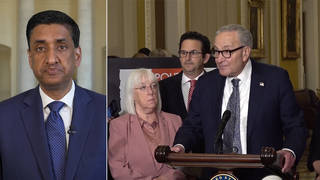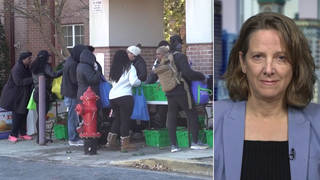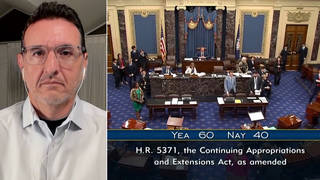
Topics
Guests
- Misty SnowDemocratic nominee for Senate in Utah. She is the first openly trans candidate to be nominated for Senate from a major party.
- Misty PlowrightDemocratic nominee for Congress from Colorado’s Fifth District. She is one of just two openly trans candidates ever to be nominated for Congress by a major party.
We speak with two transgender women who made history this week when they won their primary elections in Utah and Colorado to challenge Republican incumbents for U.S. Congress in November, and get their reaction to the Pentagon’s announcement that it will end its ban on openly transgender people serving in the military. “The only thing that should matter is, can you do the job? Nothing else,” says 33-year-old military veteran Misty Plowright of Colorado. On Tuesday, she and 30-year-old Misty Snow, of Utah, became two of the nation’s first openly transgender candidates to win a major-party congressional primary in U.S. history. “My trans status didn’t come up” on the campaign trail, Plowright notes. “They were much more focused on issues, my stances.”
Transcript
JUAN GONZÁLEZ: We turn now to election news. History was made on Tuesday when two transgender women were nominated by Democratic primary voters in Utah and Colorado to challenge Republican incumbents for the U.S. Congress in November. Thirty-year-old Misty Snow of Utah and 33-year-old Misty Plowright of Colorado are two of the nation’s first openly transgender candidates to win a major-party congressional primary in U.S. history.
AMY GOODMAN: Misty Snow was a late entry into the Utah primary race, offering a progressive alternative to conservative Democrat Jonathan Swinton. She beat him in Tuesday’s race with 59.5 percent of the vote to his 40 percent. Snow will now face incumbent tea party Republican Senator Mike Lee in the general election. IT worker Misty Plowright similarly beat out her primary opponent by more than 16 percentage points. She’ll challenge Republican incumbent Congressmember Doug Lamborn in what’s considered one of the most conservative districts in Colorado.
For more, we’re going to go directly to Denver, where Misty Plowright is in studio at Denver Open Media.
Welcome to Democracy Now! Talk about your victory and the significance of this moment, Misty.
MISTY PLOWRIGHT: Thank you very much, and thank you for having me. This primary was very, very cool, very interesting. And, you know, I find it very humbling that in, as you said, what is traditionally thought of as a very conservative district, even among Democrats, would nominate—nominate me for the U.S. House in that district.
JUAN GONZÁLEZ: And how was your candidacy received when you were out on the campaign trail?
MISTY PLOWRIGHT: Out on the campaign trail, people were very receptive. My trans status actually didn’t come up very often at all. And the few times it did, people were just kind of asking questions because they weren’t really sure, you know, what it was. But people didn’t really make an issue of it. They were much more focused on issues, my stances on things. And that’s really how I prefer it to be. I want to campaign on issues, and I’d like to win on issues.
AMY GOODMAN: So, talk about your race and what you think the critical issues are, just outside of Colorado Springs. I mean, we’re talking about one of the most conservative areas in the country.
MISTY PLOWRIGHT: Well, actually, that’s something that I’m not sure that I agree with. Colorado Springs and the area around it is not as conservative as people tend to think that it is. You know, certainly, Focus on the Family and similar organizations get a lot of attention. But realistically, Colorado Springs itself, it’s more libertarian than it is conservative. And, you know, out on the campaign trail, jobs are a big concern, especially—you know, Colorado Springs is the most populous area in this district, but it covers a lot of area outside of Colorado Springs. And, you know, there’s a lot of people struggling in that district. So, it’s—I think that’s one of the biggest concerns for a lot of people.
JUAN GONZÁLEZ: And talk about what inspired you to run. You were a late entrant into the campaign. Why—the process that you went through in deciding to run?
MISTY PLOWRIGHT: Well, this has actually been a very long process. I mean, the answer to, you know, the question is a very long one. But basically it boils down to I couldn’t sit on the sidelines anymore. I had to really get involved at a much different level. I didn’t think I could sit on the sidelines anymore, casting a vote here and there and hoping that something changes. You know, “be the change you want to see in the world” are words I’ve tried to live by for a very long time. And anytime someone has been like, you know, “There’s no way you can win there,” it’s like, you know, everything’s impossible until it’s done.
AMY GOODMAN: On Thursday, Defense Secretary Ash Carter announced the Pentagon will end its ban on openly transgender people serving in the military. This is what he said.
DEFENSE SECRETARY ASHTON CARTER: Our mission is to defend this country, and we don’t want barriers unrelated to a person’s qualification to serve preventing us from recruiting or retaining the soldier, sailor, airman or marine who can best accomplish the mission. We have to have access to 100 percent of America’s population for our all-volunteer force to be able to recruit from among them the most highly qualified and to retain them. … The reality is that we have transgender servicemembers serving in uniform today. And I have a responsibility to them and to their commanders to provide them both with clearer and more consistent guidance than is provided by current policies.
AMY GOODMAN: Under the new rules, the military will provide all healthcare, including surgery, to transgender troops. Many hailed the decision as a step forward in LGBT rights. Victoria Rodríguez-Roldán of the National LGBTQ Task Force said, quote, “This decision is a great victory for the many trans people who have served and sacrificed in the military over the years.” But others criticized it, like award-winning writer Mattilda Bernstein Sycamore, who wrote, quote, “How far we have come from the original goals of gay liberation as it emerged in the 1960s and 1970s—an end to the oppressive state, organized religion and the nuclear family—a rejection of war, racism, white supremacy and imperialism,” she wrote. Misty, your response, as now a Democratic nominee for Congress, as a trans woman yourself and as a military veteran, Misty Plowright?
MISTY PLOWRIGHT: I think it’s a lot more than just a victory for the LGBT community. I think it’s also an amazing thing for America itself. We keep striving to realize our lofty ideals. And anyone who wants to serve this country and is capable of fulfilling the job of doing so should be allowed to. It shouldn’t matter who you are or—I mean, the only thing that should matter is, can you do the job? Nothing else.
JUAN GONZÁLEZ: Well, you would be considered a longshot candidate against Representative Doug Lamborn. What do you see as his primary weaknesses and what you will hope to gather a majority of the voters around your—how you would gather them around your candidacy?
MISTY PLOWRIGHT: Well, there’s five military installations around Colorado Springs, and Mr. Lamborn is very weak on veterans’ issues. And that’s something that I can really go after him on and I intend to go after him on pretty heavily. He’s also in favor of the TPP. He blasts Obama for it, but then he votes to fast-track it. So, he’s pretty vulnerable on a lot of issues. And it’s just a matter of taking my case to the people and really making it all about the issues and just hammering away on that.
AMY GOODMAN: Misty Plowright, we’re trying to get Misty Snow in studio in Salt Lake City. We’re having a little technical problem. But I wanted to ask you about Bernie Sanders’ campaign, if that inspired you, and about the platform debate that’s now going on, the Democratic platform.
MISTY PLOWRIGHT: Yeah, Bernie Sanders was certainly an inspiration and, you know, definitely a part of what was behind my run. You know, I mean, he’s said from the get-go he can’t do it alone, you know, so that was definitely a part of my decision to run. And the platform, I’m not surprised at all by what the party leadership is doing. I, myself, was actually an unaffiliated until July of last year, and I’m not shy about criticizing the Democratic Party leadership, especially with—you know, like they refuse to put in language against the TPP. And they’ve shot down just about every progressive idea that really drove a lot of things in this election cycle and during the primaries and caucuses. Democrats don’t lose elections because they’re not conservative enough. They lose elections because they’re not the party of the people anymore. The voice of the people has been lost. And that really needs to get brought back to the party. So, it doesn’t surprise me what they’re doing with the platform. But Bernie Sanders is right: They need to wake up, because my generation is—frankly, we’re not going to put up with that kind of crap for very long.
AMY GOODMAN: And your thoughts on Hillary Clinton and the whole the Bernie or Bust movement, and Donald Trump, the—at least at this point, the presumptive Republican nominee?
MISTY PLOWRIGHT: Yeah, Donald Trump is scary. He’s like 1930s Germany scary. He’s scary. I understand the Bernie or Bust movement. I was—I considered myself Bernie or Bust for quite a while. I’m really not sure. I have a lot of deep, deep concerns and issues with Hillary Clinton. I was actually a Hillary supporter in 2008. But her tenure as secretary of state got into a lot of things and destabilized a lot of regions in the world, that really make it hard for me to be able to get behind her. I mean, I certainly don’t want Trump, and I’ve never subscribed to the lesser-of-two-evils thing.
AMY GOODMAN: Misty Plowright—
MISTY PLOWRIGHT: And I’ve never cast a vote—
AMY GOODMAN: We got Misty Snow on the line with us, the Democratic nominee for Senate in Utah—
MISTY PLOWRIGHT: OK.
AMY GOODMAN: —the first openly trans candidate to be nominated for Senate from a major party, won the Democratic primary in Utah on Tuesday. Welcome to Democracy Now!, Misty Snow. Talk about the significance of your win and how you plan to win in November.
MISTY SNOW: Well said. I think it’s a great moment in our country for the LGBT community, especially trans people. I’ve had a lot of people reaching out to me, telling me how much it means to them that I’m running. And someone even told me that they’re—like a trans woman in Texas told me she wants to actually run for House of Representatives in 2018. So I’m making a difference just by running.
And how I’m going to win in November is, you know, my opponent, he has like a 38 percent approval rating right now, and I’m already polling at 37 percent, which is better than Democratic Senate candidates typically do in Utah. And that was before I won the nomination, when I didn’t have as much name recognition as I do now from all the press. And, you know, I think the way to do it is just to try to use this moment, you know, to try to start appealing to people all across the nation, especially like the Sanders supporters, who were able to give Bernie Sanders a competitive campaign with small donations, without corporate funding. And I think, you know, we need to really make the case that, for the revolution to continue, you know, those people, those same donors, need to start donating to congressional candidates all over the country to get progressives elected.
AMY GOODMAN: Misty Snow, we’re going to have to leave it there. I want to thank both of you for joining us. You’ve both made history, Misty Snow in Utah and Misty Plowright in Colorado, the first openly trans women to win their party’s nomination for the race in November.
That does it for the show. Tune in Monday for our July 4th special, when we feature the words of Frederick Douglass and Saul Williams and Jesse Williams. I’m Amy Goodman, with Juan González. Thanks so much for joining us.












Media Options